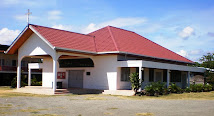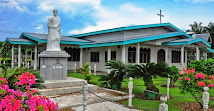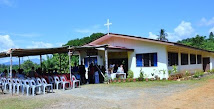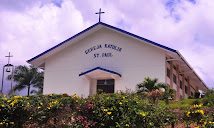Reported
by Dalius L. Lobinjang
Sandakan: A
delegation of 11 guests from Sabah paid a return visit to Heilbronn Germany
under the banner of Sabah Heilbronn Ecumenical Partnership (SHEP). This
partnership between Sabah and Heilbronn, Germany, aims at promoting awareness
and better understanding of ecumenism, ecumenical sharing of resources as well
as enhancing mission and theological education of both parties. Based on the agreement
signed on August 1990, includes: to experience fraternal unity and enrich each
other, in whatever possible way along Christian journey, and to experience and
share together the salvation of the Lord for all mankind.
One main activity of the partnership is the exchange of
cordial and mutual ecumenical visits, organised once in two years, between the
churches of both countries. This partnership consists of the Catholic churches
from Archdiocese of Kota Kinabalu, Diocese of Keningau and Diocese of Sandakan,
the Sabah Basel Council of Churches Malaysia (BCCM) and the Protestant Churches
of Sabah (PCS) with the Catholic and Protestant Churches of Heilbronn, Germany.
This partnership is a smaller movement towards a greater
Christian unity (which is called ecumenical); a movement to restore unity among
all Christians, and is one of the principal concerns of the Second Vatican
Council as stated in the Decree on Ecumenism Unitatis Redintegatio. The decree exhorts all Catholics to
participate in the work of Christian unity through conversation, dialogue, and
service with a complete honesty, gentle and mutual respect and trust with one
another. Even the present Pope too, has been vocal in promoting the movement
through dialogues, conversations and engagements with other Christian
denominations.
The delegation from Sabah was represented by 6 Catholics from
the three dioceses, 3 from the BCCM and 2 from the PCS. They arrived at 11am, Friday,
23rd September, in Stuttgart International Airport. Upon arrival, they were welcomed by Michael
Dieterle and Klaus Deicke from the SHEP German counterpart. They travelled a
one and a half hour drive to Heilbronn; there to meet up with their host
families over a Germanic luncheon fellowship. The Sabah SHEP 2016 delegates headed
by Fr. Thomas Yip from the Catholic Archdiocese Kota Kinabalu gave a brief
introduction of the Sabah SHEP mission to Germany and followed by self-introduction
of the guests and host families. Their 3 weeks in Heilbronn will indeed be a
great experience; staying with 3 different host families and enjoying the
coolness of the country.
Staying with the host families helped the delegates to observe
and broaden their perspective living in a different house, culture, language, habits, food, spiritual
life and et-cetera. It was very heart-warming to see the host putting an effort
in making their guests comfortable and in doing their best to incorporate them
to their family life despite the cultural and language differences. On Sunday, the
delegates attended Sunday mass or service with their host families in their
respective churches. It was a privilege to the SHEP delegates as on the first Sunday,
two priests (Fr. Thomas Yip and Fr. Stanley Matakim) had the opportunity to
con-celebrate mass at St. Agustinus Catholic Church, Heilbronn. Although the
mass was in German, a language they did not understand, yet, the language of
the Spirit of Christ made it possible. The first notable sign of ecumenism
practice was when the delegate stayed with host families with ecumenical
marriages (a
Catholic married to a baptized non-Catholic), which is a non-issue for them. The
couple has the understanding and respect of each other’s commitment to remain
true to his or her religious practice. They compromise to which church they
will attend on Sunday. Both take the role in the religious education of their
children but the choice is determined by their children themselves as to which
Christian faith they will embrace.
The relationship
with the host families was close as they did their best to include the guests
in any family events, celebrations or feast days. One such memorable event is
the official opening of Vine Harvest season celebration in Wartburg, whereby
the guests had the opportunity to visit the vineyard and gain the knowledge of the
wine making process. Heilbronn is one of a well-known wine region; the surrounding
hills are covered in grape vines. Other notable feasts are the blessing of seasonal
crops harvested before winter season in churches during the second Sunday and
visiting the Tamu-like market where farmers display and sell their freshly
harvested crops, by-products and their traditional foods. The inclusions of
their guests in these local events have made a closer family-like bonding that
will definitely strengthen the partnership ties in a long run and has already
been in-relationship for some 25 years. Probably some of the delegates’
only regret was that they didn't get to stay longer and build their
relationship better with each of their 3 assigned hosts.
Paying
a courtesy call to the local authority of Heilbronn was a polite gesture as
visitors from Sabah SHEP mission to Germany. These eleven delegates visited the
Town Hall office on 26th September, where at hand to receive them
was the Deputy Mayor of Heilbronn. Heilbronn is a municipality in the State of Baden-Württemberg, with Stuttgart as the Capital
City. He briefed them by power-point presentation on the aspects of geography,
governance, historical background, and economy and tourist attractions of
Heilbronn and at the end of the session; he presented small packs of salt to
everyone, which Heilbronn is popularly known as a salt producing underground
mine in the country. In response, Fr. Yip thanked him for the warm-welcome and
presented him a memento to mark the long standing SHEP relationship with this
City. The importance of SHEP visit to the municipality of Heilbronn has also
been publicised in their local newspaper.
On
ecumenical program, the delegates called upon the offices of both Protestant
and Catholic Deaneries. A Deanery is a group of parishes within a diocese; and is a strategic mission unit in the
diocese. Their first deanery visit was a Protestant Deanery (Wihelmstrasse) where
they were briefed by the Dean Otto Friedrich on the aspects of their pastoral
works in Heilbronn. One highpoint of deaneries visited were their kindergarten schools
wherein one such school (Schillerstrasse)
caters to children from as young as 4 months to 12 years of age. These
kindergartens are owned by deaneries as part of their pastoral work; manned by
employees irrespective of their Christian denomination and caters to children
of all races, background and religion.
In a
Catholic deanery, the delegates also participated in a session with the
refugees over a high tea in Heilbronn. The deanery office has allocated an
afternoon, every Wednesday, in their hall, where refugees and immigrants get to
socialise together through fellowship. Likewise, they meet up with their German
Christian ecumenical brothers and sisters who volunteer in the refugee ministry
of the Roman Catholic Church. These volunteers assist them with documentation
as long as it is stipulated by laws, helping them in finding works and supporting
the government policy in integrating them in the society. Surprisingly during
the session, the refugees who came were mostly Syrians and they are Muslims.
They left their war-torn country and chose Germany because of their open-door
policy. Generally, the Germans are staunch supporter of human rights policy
irrespective of their culture, background or belief. The Deanery, in a way, shows
its support to this advocacy through their human right programs and activities.
In Stuttgart,
27th September, the delegates had the opportunity to attend the
concluding service of the international ‘Partnership Consultation’ organised by
the Evangelical-Lutheran Church (Wurttemberg
Church) where the Christian Protestant leaders around the world converged for Christian
mission solidarity. The sermon by Bishop Dr. Frank Otfried July also
acknowledged the SHEP delegates when in his opening remark said, “we have
gathered here as Christians from different countries around the world. We have
gathered here because we are united as partners, and as partners we want to
learn new things not least from one another. I would be delighted if we have
found new ideas, made new connections and felt a unity in spirit amongst us
through the bond of peace (Eph 4:3)”. Although SHEP is not connected with their
Partnership Consultation, but indeed it has paved ways for a closer ecumenical
dialogue and engagement. Incidentally, the SHEP delegates also met the BCCM
Bishop of Malaysia and PCS representative, both were from Sabah. During the
visit, the delegates also reunited with Ralf Rohr Bach, a SHEP veteran who has
visited Sabah a few times.
A
profound experience was probably when the delegation visited Mission 21 in
Switzerland on 29th September. Mission 21 is an
international church missionary based in Basel; the work of the Evangelical Reformed Church that commission
its missionaries to evangelise throughout the world. Mission 21 is connected
to 70 partner churches and Christian organisations all over the world.
This is a joint effort for a peaceful and just world with approximately 100
programmes and projects in Africa, Asia and Latin America. In Sabah, they are
connected with the BCCM and PCS which can be traced back in the early 1900s. Among
the program being planned in this center was a meet -together -session with the
missionaries sent to North Borneo in 1950s – until they were expelled from
Sabah during the 1970s. Surprisingly some of these elders in their late 70s and
80s still understand and speak Bahasa Melayu and Rungus. The SHEP delegates especially from the BCCM
and PCS had an emotional encounter with them knowing that these missionaries
had sacrificed their young age to bring the light of salvation to their
grandparents in Kudat, Sabah. The feeling was overwhelming when they entered
the chapel; a place where they contemplate on the missionaries who will spend
their quiet moment for prayer before they were shipped out to countries which
they know that they might not return again to their homeland. This visit had
somehow also given an impact to the Catholic delegates to reminisce and also to
appreciate the sacrifices of the Mill Hill priests and religious in bringing
the faith to this part of the world.
One particular distinguished experience was when the delegates
were given a guided opportunity to access the Mission 21 headquarters’ archive
where documents are kept dated way back to the 1600s. Interestingly, the Basel
missionaries ever set foot as early as 1860s in Kudat from Hong Kong to
propagate Christianity: first to the Chinese and later it was evangelised to
others especially to the Rungus native of the Northern part of Borneo. In their
collection, the delegates were also shown the oldest Malay written Bible dated
in 1821 where it clearly referred God as “Allah”. A Malay word which created so
much controversy in Malaysia.
A one day program, on 3rd October, was allotted
for ecumenism discussion entitled ‘Living Ecumenism in Practise’ in a
Protestant evangelisation centre, Lowenstein. The delegates and their host
families had the opportunity to listen to the talk on “ecumenism and its
challenges in Germany” by a Catholic from Heilbronn deanery. She acknowledged
that liturgical practise is still a challenge in ecumenism but that is not an
excuse or a hindering factor towards Christian unity. This is in line with the
Catholic Decree which states that “Ecumenical
conversation leads us back to prayer”. This change of heart and holiness of
life, along with public and private prayer for the unity of Christians, should
be regarded as the soul of the whole ecumenical movement, and merits the name “spiritual
ecumenism”.
On the 04th October, the delegates were given the
audience to the Catholic Bishop of Diocese of Rottenburg-Stuttgart, located in
the town of Tubingen, a city popularly known as the University City in Germany.
Unfortunately, the Bishop had to attend to an urgent matter and was represented
by the assistant Bishop. They were briefed that the diocese is oriented towards
the 2nd Vatican Council which is highly involved in the ecumenical
movement in Germany. This diocese not only caters to serve in Germany but also
renders and supports projects in terms of granting aid to sister churches in
Africa, Asia, Latin America, Oceania and Eastern Europe. This information is
probably beneficial for young Catholic dioceses or parishes in Sabah to seek
means of aid from their counterpart in Germany.
In
appreciation of this visit, SHEP Germany organised a celebration called a “Sabah
Day” held on the 9th October, to commemorate the long standing
relationship between these countries. Even posters were being put up in public,
in town and in churches demonstrating their commitment towards this partnership
and in welcoming their guests from Sabah. The event started by Heinrich-Fries
House where the delegates joined the protestant celebration of Dancing for Peace
at 2.30pm and then later on, at 5.00pm, together with all the host families
attended an Ecumenical prayer at St. Agustinus Catholic Church. The common
prayer was said by turn in German, English and Bahasa Malaysia by a priest, pastor
and dean of both countries. After the service, all adjourned to the church
parish hall for fellowship with all of their hosts and guests. During the
fellowship, the Sabah SHEP delegates performed the popular state dance Sumazau
and invited the hosts and guests to join them on the floor to have a feel of
Sabah’s traditional dance. The German
hosts and their guests had an enjoyable, fun and lively event that probably
will leave an unforgettable memory of this partnership visit to them.
On 10th
October, the German organising committee SHEP conducted an evaluation session
with the delegates to review their effectiveness in hosting the SHEP 2016. The
session was facilitated by the SHEP veterans, Ralf Rohr back, Michael Dieterle,
Rolf Krieg, Anita Disch, Ilse Muff and Klaus Diecke. The discussion revolved on
what is running short, what sticks to the delegate’s memory, things that they
don’t like , things that are remarkable and their best experiences during the
visit. From the information gathered, they will forward their findings and
recommendations to the next hosting committee of Sabah SHEP.
Over
the course of 3 weeks, the delegates had visited numerous historically and architecturally significant churches, cathedrals,
monasteries and old castles over Heilbronn and Stuttgart in Germany, Basel in
Switzerland, Strasbourg in France and Ehrwald in Austria. While visiting
these holy sites, the delegates took the opportunity for a time of personal intercession,
to pray for a special intention or an occasion to offer thanksgiving for
blessings received. One such unique experience was praying in a chapel on the
peak of snow covered Alps Mountain, Zugspitze. Not only had the visit offered stunning
panoramic scenery but it had also refreshed one spiritually by merely beholding
upon the wonders and beauty of God’s creation. The Catholic delegates were
privileged to obtain a plenary indulgence during the visit in this Jubilee Year
of Mercy by passing through designated Holy Doors in every Catholic
cathedral and churches in Germany.
Apart
from the ecumenical programs being planned for the delegate, the SHEP partners
in Germany were generous enough to accommodate tours and sightseeing with all
expenses borne by them in selected cities like Stuttgart, Basel, Strasburg and
the Alps.
SHEP
partnership visit has indeed enriched the delegates perspective in the ecumenical
movement, strengthened the relationship ties among the partnership, nurtured
the understanding and respect of one’s belief irrespective of whether they are
Protestant or Catholic, and in the personal level, has broadened their
perspective in experiencing life in a developed country like Germany. In the
next two years, Sabah SHEP will be the host for the German SHEP visit to
Malaysia.


















































.JPG)







No comments:
Post a Comment